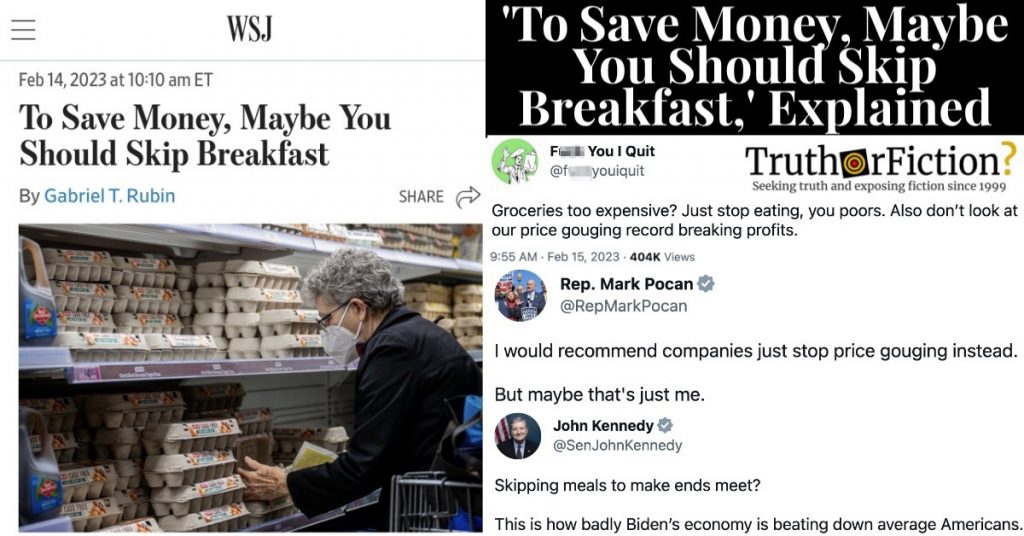On February 15 2023, a popular tweet showed a screengrab of a purported headline (“To Save Money, Maybe You Should Skip Breakfast”) in the Wall Street Journal on February 14 2023:
Meme accounts, politicians, and pundits all weighed in on the topic as screenshots spread across Twitter and FARK.com:
Fact Check
Claim: A February 14 2023 Wall Street Journal headline read: “To Save Money, Maybe You Should Skip Breakfast.”
Description: A February 14, 2023 Wall Street Journal headline read: ‘To Save Money, Maybe You Should Skip Breakfast.’ The headline led to an article discussing the increase in price of eggs and other breakfast foods.
Several of the tweets above included links to the Wall Street Journal‘s website, WSJ.com. Clicking led to the article (validating its existence), but only the headline and a very brief preview were visible to the majority of visitors:
Feb 14, 2023 at 10:10 am ET
To Save Money, Maybe You Should Skip Breakfast
By Gabriel T. RubinSeveral breakfast staples saw sharp price increases due to a perfect storm of bad weather and disease outbreaks—and continued effects from Russia’s invasion of Ukraine.
Egg prices increased 8.5% in January [2023] from a month earlier and are up 70.1% over the past year, the highest annual rate since 1973. The deadliest avian-influenza outbreak on record has devastated poultry flocks across the U.S., leading the price of eggs to rise more than any other grocery item in 2022, according to Information Resources […]
The Wall Street Journal‘s paywall for digital content was the subject of a 2018 analysis by NeimanLab.org, “After years of testing, The Wall Street Journal has built a paywall that bends to the individual reader.” It focused on how the newspaper leveraged its paywall to convert visitors into subscribers:
Non-subscribed visitors to WSJ.com now each receive a propensity score based on more than 60 signals, such as whether the reader is visiting for the first time, the operating system they’re using, the device they’re reading on, what they chose to click on, and their location (plus a whole host of other demographic info it infers from that location). Using machine learning to inform a more flexible paywall takes away guesswork around how many stories, or what kinds of stories, to let readers read for free, and whether readers will respond to hitting paywall by paying for access or simply leaving. (The Journal didn’t share additional details about the score, such as the exact range of numbers it could be. I asked what my personal score was; no luck there, since the scores are anonymized.)
NeimanLab disclosed the 2018 price tag for an annual subscription, $222, and explained that the internal scoring dictated whether unsubscribed visitors could access individual articles. Notably, the story described functionality designed to tempt readers “tantalized” by teaser access:
The Journal has found that these non-subscribed visitors fall into groups that can be roughly defined as hot, warm, or cold, according to Wells. Those with high scores above a certain threshold — indicating a high likelihood of subscribing — will hit a hard paywall. Those who score lower might get to browse stories for free in one session — and then hit the paywall. Or they may be offered guest passes to the site, in various time increments, in exchange for providing an email address (thus giving the Journal more signals to analyze). The passes are also offered based on a visitor’s score, aimed at people whose scores indicate they could be nudged into subscribing if tantalized with just a little bit more Journal content.
That previous examination of the Wall Street Journal’s paywall and its focus on converting visitors to subscribers aligned with one of several February 15 2023 tweets about the viral article:
In the brief excerpt from the article (above), the WSJ mentioned an increase in egg prices in 2022 and 2023. We accessed the entire article, which was short enough that not much more can be excerpted, and it continued on in the same fashion — reporting that frozen “noncarbonated juices and drinks,” breakfast cereals, and coffee also went up in price in 2022 and 2023.
It was not an opinion piece nor a prescriptive article, and it focused solely on year-over-year percentage increases for eggs, cereal, coffee, and some juices. The only mention of “skip[ping] breakfast” occurred in the headline, seemingly designed to “tantalize” readers and create anger-based engagement on social media — a clearly successful strategy known as “engagement bait.”
On February 15 2023, social media users shared screenshots of “To Save Money, Maybe You Should Skip Breakfast,” a Wall Street Journal article from the day before. That very short article was behind a hard paywall for nearly all readers, and visible reporting described an increase in the price of eggs. The hidden remainder of the piece discussed similar fluctuations in the cost of “breakfast foods,” and the provocative headline combined with the paywall led readers to reasonably interpret the paywalled reporting as a recommendation that Americans begin rationing food.
- To Save Money, Maybe You Should Skip Breakfast | Twitter
- To Save Money, Maybe You Should Skip Breakfast | Fark
- To Save Money, Maybe You Should Skip Breakfast | Twitter
- To Save Money, Maybe You Should Skip Breakfast | Twitter
- To Save Money, Maybe You Should Skip Breakfast | Twitter
- To Save Money, Maybe You Should Skip Breakfast | WSJ
- After years of testing, The Wall Street Journal has built a paywall that bends to the individual reader

